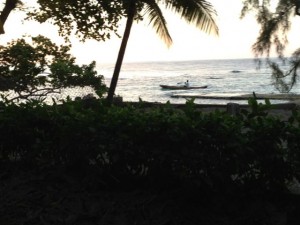The mad dogs & Englishmen link to Haiti’s tourism hopes

Haiti is beautiful if you see it without the filters placed by journalists (including moi). Paul Clammer tells a story about Haiti that’s markedly different from the generally accepted narrative – Photo by Rashmee Roshan Lall
I met Paul Clammer in Port au Prince tonight and it would be fair to say he has all the makings of a Haitian hero. Or an English hero. Or perhaps, a world hero, sans all geographical boxes because he has arguably done much to liberate the collective imagination and allow it to wander whither it pleases.
To Sudan. To Haiti.
“You only do this because you’re English, because only the English do mad things?” I asked him in an unsubtle reference to the generally accepted view that only mad dogs and Englishmen go out in the midday sun. Or to countries like the Sudan and Haiti to write bright tourist guides,
“Of course,” Clammer replied straight-faced. God bless the English sense of humour.
Clammer recently released the Bradt Guide to Haiti. Its publicity gurus describe the guide as the “most in-depth travel guide ever published on the country.” But they would say that wouldn’t they? They have whole shelves of books to sell.
Yes. And no. Clammer’s guidebook to Haiti comes at a particularly important time for a country that is routinely described in the following seven-word, six-word and four-word capsules. They are as follows:
* impoverished, tragedy-scarred and politically tumultuous country
* most impoverished country in the Americas
* quake-affected, cholera-stricken
And yet Haiti’s glamorous, go-getting tourism minister is actively pursuing tour operators, package deal companies and just about anyone who cares (or dares?) to visit.
And Clammer had the gumption to, as he wrote in The Huffington Post, “work on a new travel guidebook to Haiti (even though) the last time anyone wrote a dedicated guidebook to Haiti was during that tourism boom of the early 1980s.”
As he describes it, “travelling across the country it was blessedly easy to forget about the negative media clichés and get to know a place rich in culture and proud of its music, art, literature and freedom. Haiti is the only country in the world born of a successful slave rebellion and that history is written across the landscape for visitors to see.”
Heroic stuff. It’s not quite a love song. But it has enough affection, or perhaps more importantly, enough regard, to be worth a second look.


